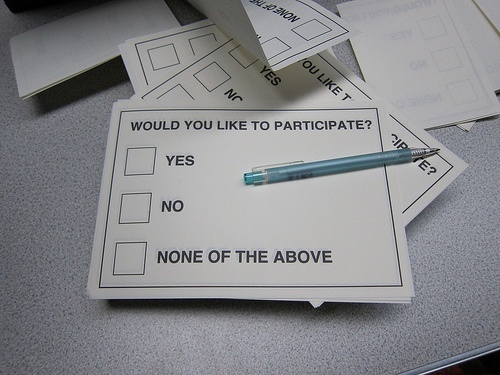
Often With Ballot Access Denied Voters Cannot Choose Constitution, Justice and Socialist Parties
Democracy, elections and voting at Democracy Chronicles
by Wikinews
The state of Illinois, which accounts for 20 Electoral College votes, automatically grants ballot access to any presidential candidate that files a petition on time. However, if a petition is challenged and does not list 25,000 valid signatures, ballot access is denied. In 2008, an individual named John Joseph Polachek took advantage of this law and submitted a petition with no signatures. No one challenged this and so Polachek appeared on the ballot.
In this election cycle, Constitution Party nominee Virgil Goode; Justice Party nominee, former Salt Lake City Mayor Rocky Anderson; Socialist Party USA nominee Stewart Alexander; and candidate Michael W. Hawkins all submitted petitions with less than 25,000 signatures in hopes that they would not be contested. However, on July 2, Cook County Green Party chairman Rob Sherman filed a challenge to the four petitions, arguing the candidates did not put in the same amount of effort as the Green Party petitioners, who, along with the Libertarian Party, collected more than 25,000 signatures. He also reasoned that additional candidates would divert potential votes from the Green Party.
Several third party activists and even some members of the Green Party condemned the actions, and asked that Sherman withdraw his challenges. He initially remained unwavering, but attempted to withdraw the challenges just ahead of the final court decision. The court would not allow Sherman to voice his change of heart, and proceeded to remove the four candidates from the ballot.
According to Sherman, Illinois Green Party counsel Andy Finko requested that he be the main objector. He further claims that before this, Finko contacted then-presumptive presidential nominee Jill Stein’s campaign chairman Ben Manski, who purportedly labeled the challenge as a “decision for the Illinois Green Party and not one for the Stein campaign.” However, Sherman says that both Manski and Stein personally contacted him a few days later, and asked that he withdraw the challenges. Sherman argued to them that he “had staked [his] national reputation on it” and that a withdrawal would hurt the Green Party ticket. He did not decide to withdraw the challenges until he felt the Stein campaign had completely deliberated over his arguments, which eventually came a couple of weeks later. Wikinews was unable to contact Manski or Stein to confirm that these conversations actually took place.
Virgil Goode offers a different perspective on the challenges. He says that Sherman, a self-identified atheist, offered to drop the Constitution Party petition challenge if Goode gave his support for the removal of “In God We Trust” from U.S. currency and “under God” from the Pledge of Allegiance. To this, Goode replied “no deal”, explaining that he co-sponsored “legislation in the House to put ‘In God We Trust’ back on the face of the Presidential dollars so that it could be readily seen by the public.” It is not known if the other candidates were given this same opportunity, but Rocky Anderson says that he personally was not. Sherman did not respond to inquiries concerning such a deal.
Goode Ballot Access Denied
For Goode, the decision may have affected his ability to participate in the presidential debates. Without Illinois’ 20 electoral votes, he may fall short of the Commission on Presidential Debates ballot access requirements. Goode currently has access in 18 states for a total of 169 electoral votes, over 100 less than the required 270. Nevertheless, the campaign is still working to get on the ballot in additional states. Furthermore, the removal may affect Green Party ballot access elsewhere. According to ballot access expert Richard Winger, the party is currently a co-plaintiff with the Constitution Party in five states in cases where ballot access laws are being challenged. He says that “state attorneys…attack the plaintiff parties …[using] the number of states in which each of the parties is on the ballot nationwide” as evidence of strength or lack thereof.
“It’s tough enough to get on state ballots without other third parties undermining the efforts” says Anderson, whose Justice Party has thus far attained ballot access in Colorado, Utah, Oregon, Mississippi, New Mexico, and New Jersey, Anderson does not fault the entire Green Party for Sherman’s “unfortunate behavior”, but the events do affirm one thing for him: “In my view, third parties should all hang together in promoting ballot access.”
Leave a Reply